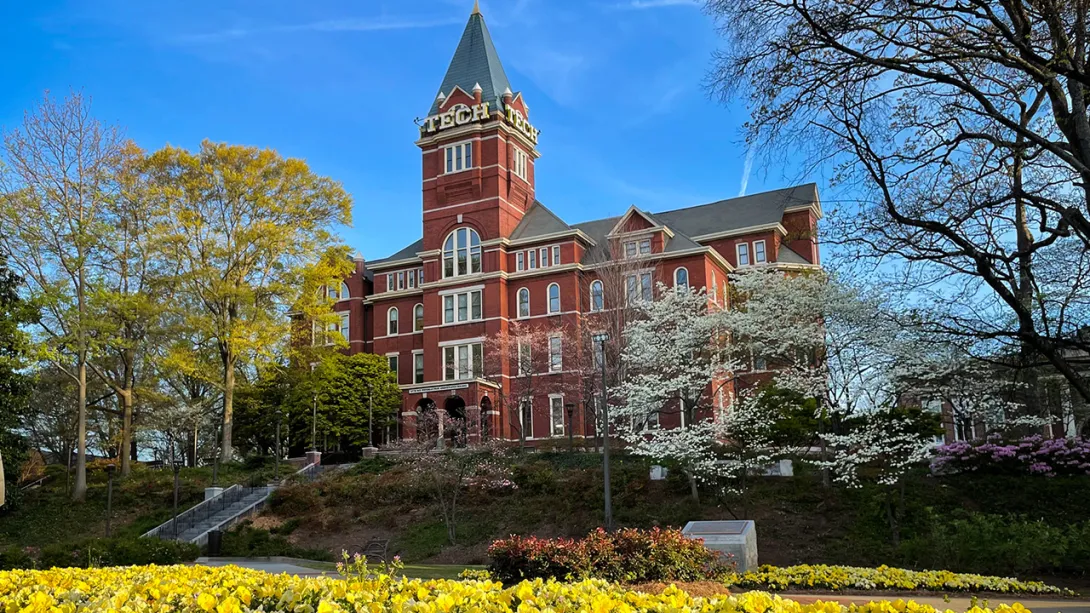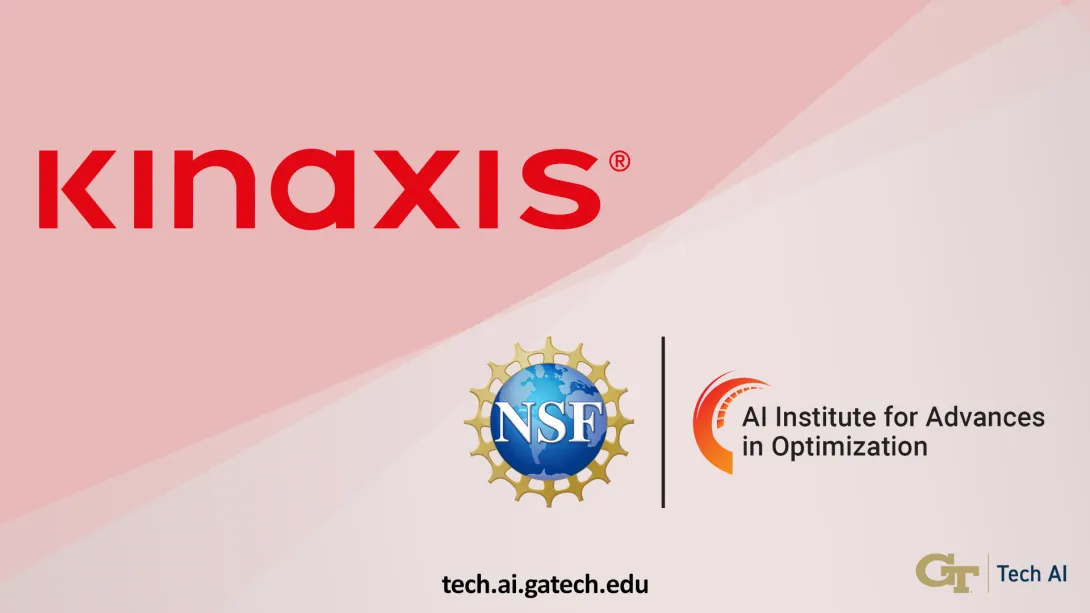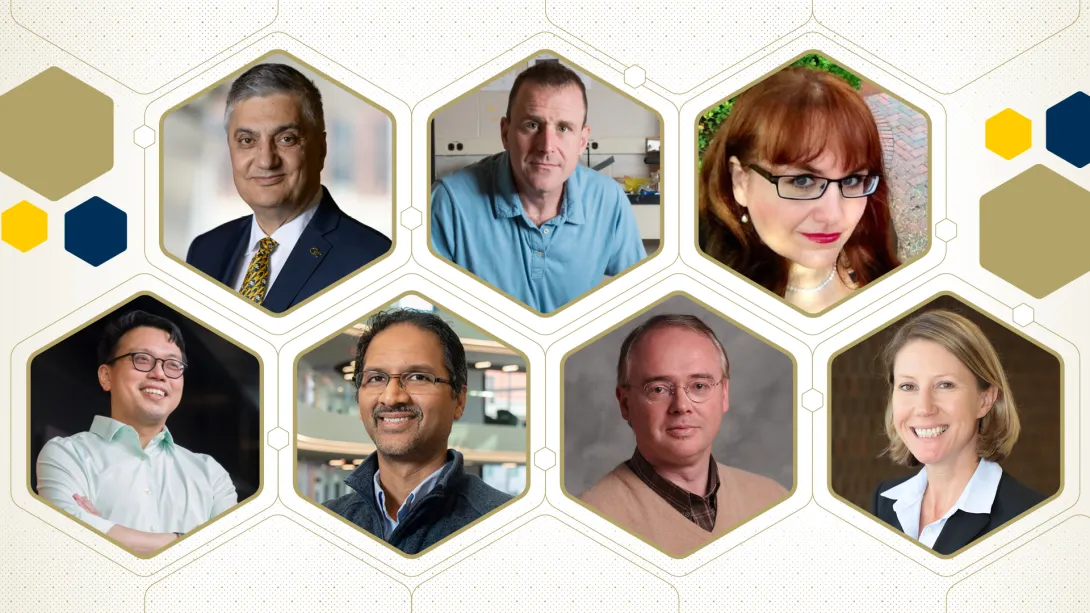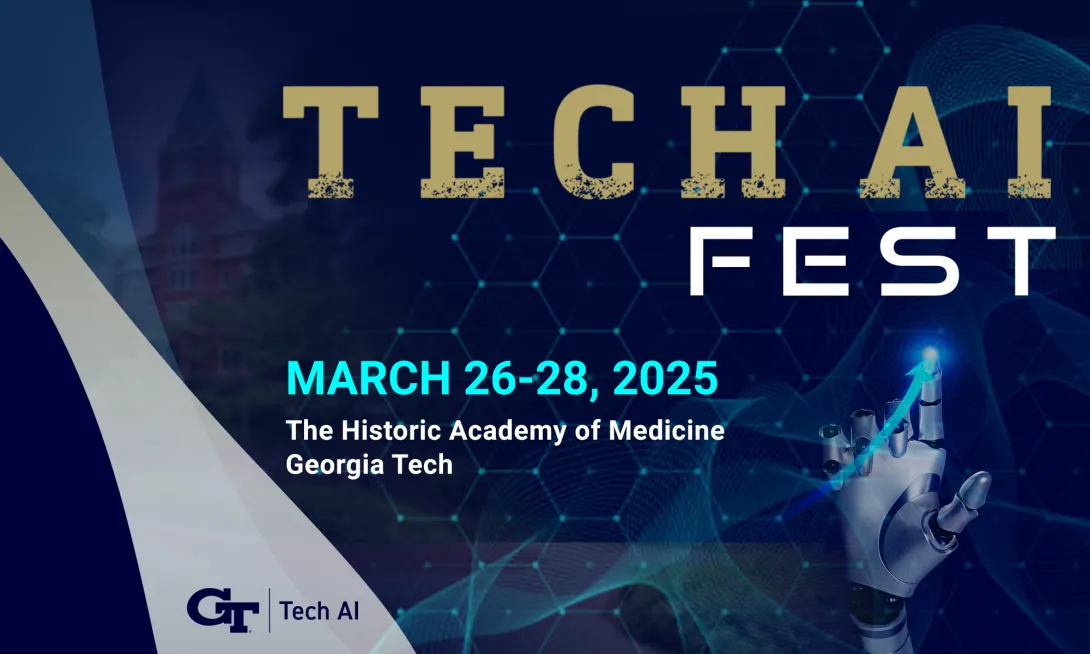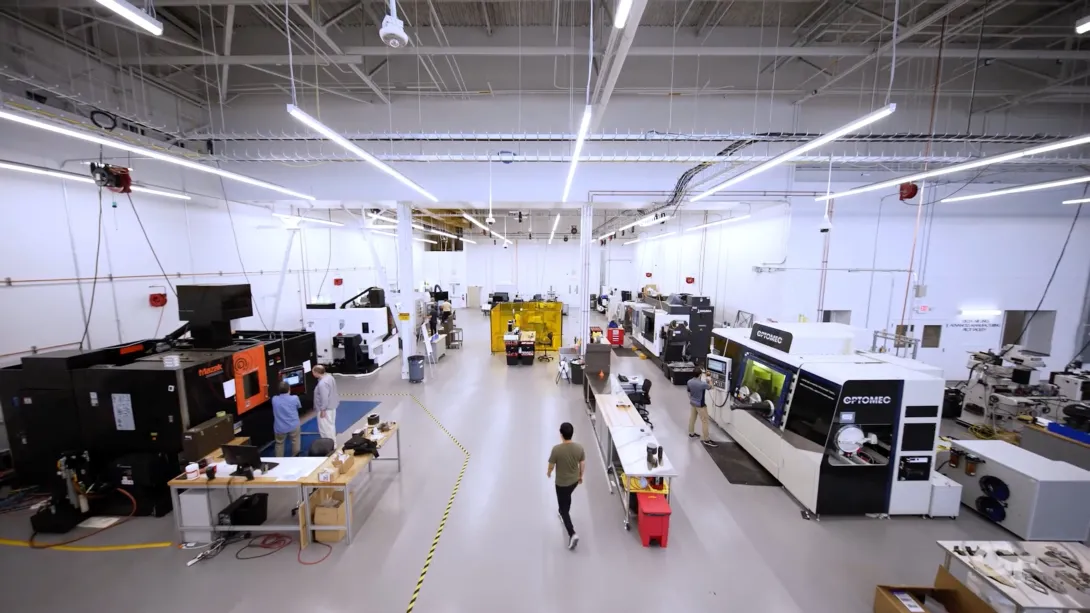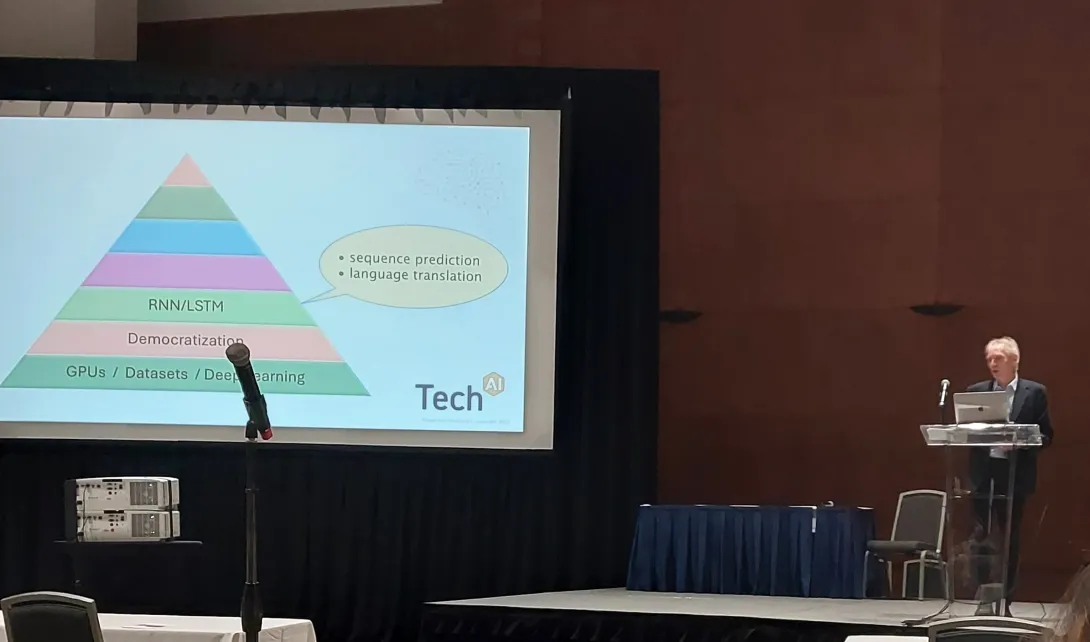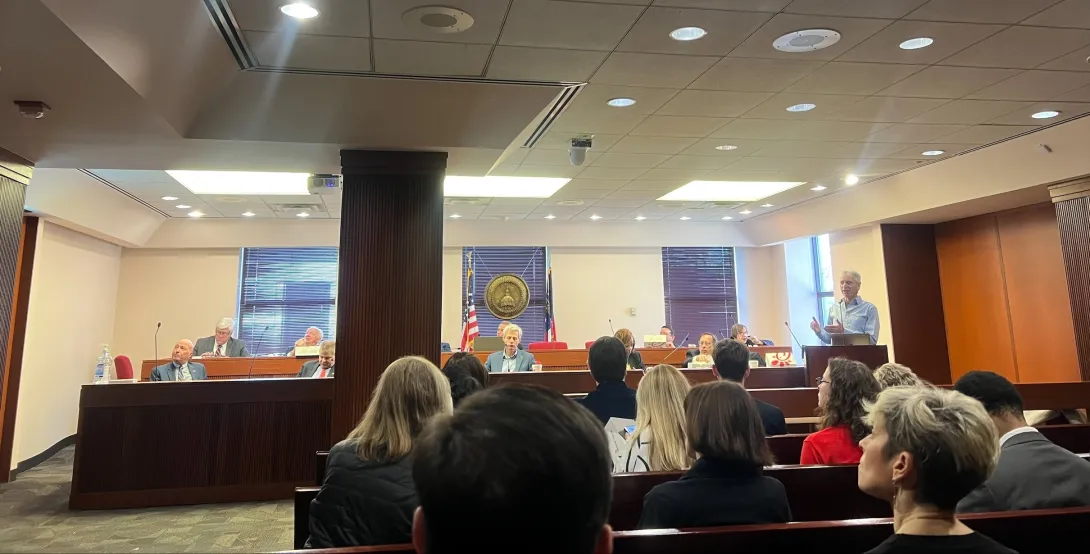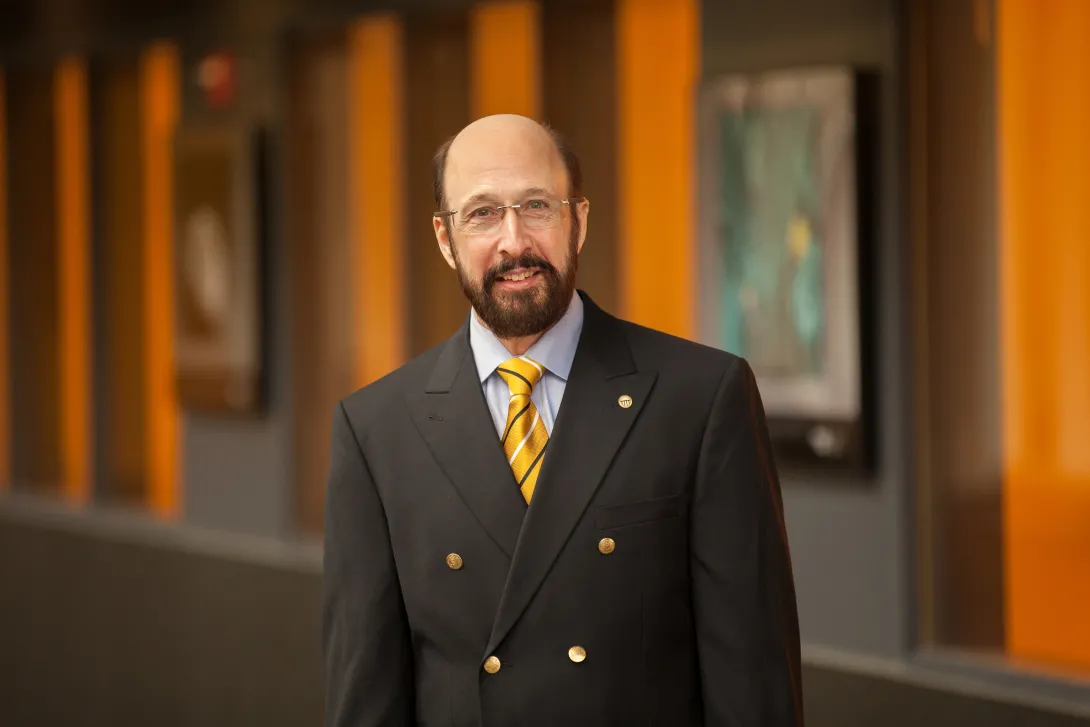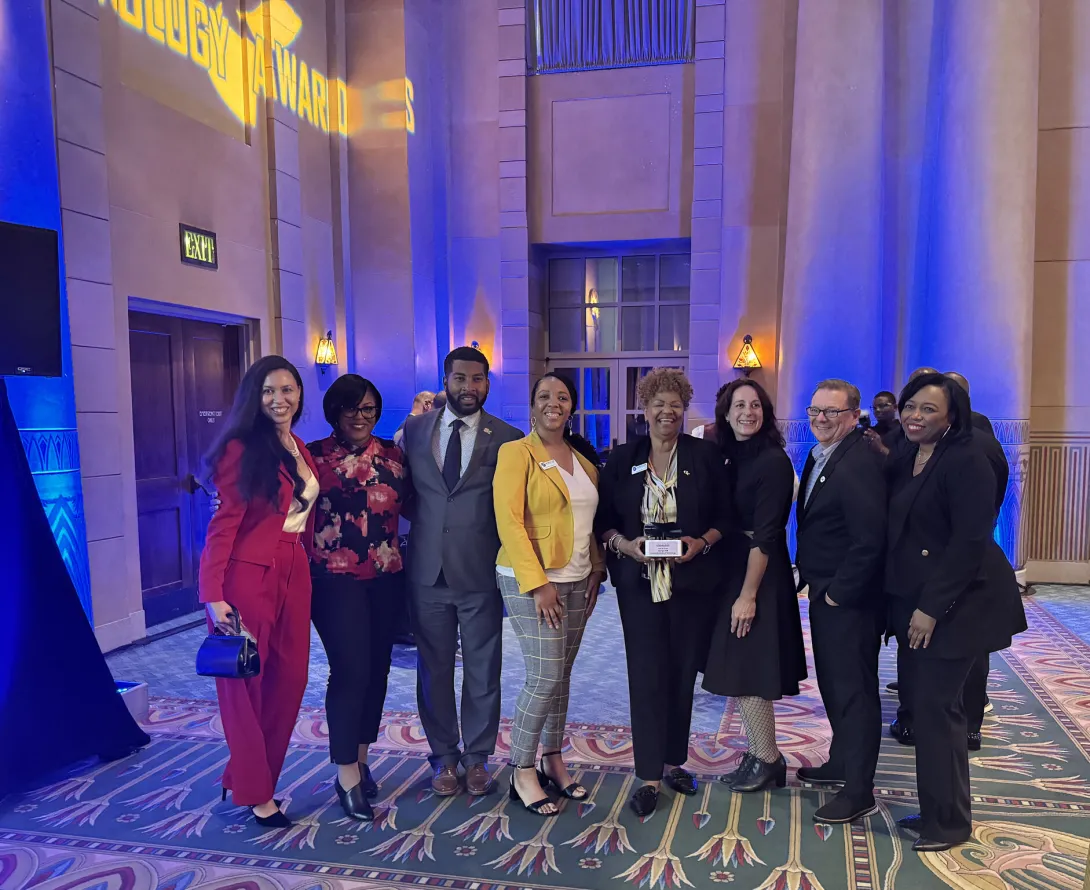Apr. 16, 2025
What’s the hottest thing in electronics and high-performance computing? In a word, it’s “cool.”
To be more precise, it’s a liquid cooling system developed at Georgia Tech for electronics aimed at solving a long-standing problem: overheating.
Developed by Daniel Lorenzini, a 2019 Tech graduate who earned his Ph.D. in mechanical engineering, the cooling system uses microfluidic channels — tiny, intricate pathways for liquids — that are embedded within the chip packaging.
He worked with VentureLab, a Tech program in the Office of Commercialization, to spin his research into a startup company, EMCOOL, headquartered in Norcross.
“Our solution directly addresses the heat at the source of the silicon chip and therefore makes it faster,” Lorenzini said. “Our design has our system sitting directly on the silicon chips that generate the most heat. Using the fluids in the micro-pin fins, it carries the heat that’s produced away from the chip.”
That cooling solution is directly integrated into the electronic components, making it significantly more efficient than conventional cooling methods, because it enhances the heat dissipation process.
The result is a much lower risk of overheating and reduced power consumption, he said.
Lorenzini, who researched and refined the technology in the lab of Yogendra Joshi at the George W. Woodruff School of Mechanical Engineering, was awarded a patent for the technology in September 2024.
Now, EMCOOL, which has five empoloyees, is actively pursuing venture capital funding to scale its technology and address the escalating thermal management challenges posed by AI processors in modern data centers.
The system uses a cooling block with tiny, pin-like fins on one side and a special thermal interface material on the other. There's also a junction attached to the block, with ports for the fluid to flow in and out. The cooling fluid moves through the micro-pin fins and helps to carry away the heat.
Since the ports are designed to match the shape of the fins, it ensures that the fluid flows efficiently and the heat is dissipated as effectively as possible at chip-scale.
As electronic devices — from high-performance personal computers to data centers used for artificial intelligence processing — become more powerful, they generate more heat. This excess heat can damage components or cause the device to underperform.
Traditional cooling methods, which include fans or heat sinks, often struggle to keep pace with the increasing demands of the newer model electronics. Lorenzini’s microfluidic system addresses the challenge of overheating with his patented, more effective, compact, and integrated cooling solution.
With the guidance of Jonathan Goldman, director of Quadrant-i in Tech’s Office of Commercialization, Lorenzini secured grant funding through the National Science Foundation and the Georgia Research Alliance to further the research and build design prototypes.
“We immediately had the sense there was commercial potential here,” Goldman said. “Thermal management, or getting rid of heat, is a ubiquitous problem in the computer industry, so when we saw what Daniel was doing, we immediately began to engage with him to understand what the commercial potential was.”
Indeed, the initial focus for the technology was the $159 billion global electronic gaming market. Gamers need a lot of computing power, which generates a lot of heat, causing lag.
But beyond gaming systems, the company, which manufactures custom cooling blocks and kits at its Norcross facility, is eyeing more sectors, which also suffer from overheating, Goldman said.
The technology addresses similar overheating electronics challenges in high-performance computing, telecommunications, and energy systems.
“This work propels us forward in pushing the boundaries of what traditional cooling technologies can achieve because by harnessing the power of microfluidics, EMCOOL's systems offer a compact and energy-efficient way to manage heat,” Goldman said. “This has the potential to revolutionize industries reliant on high-performance computing, where heat management is a constant challenge.”
News Contact
Péralte C. Paul
peralte@gatech.edu
404.316.1210
Apr. 02, 2025
Kinaxis, a global leader in supply chain orchestration, and the NSF AI Institute for Advances in Optimization (AI4OPT) at Georgia Tech today announced a new co-innovation partnership. This partnership will focus on developing scalable artificial intelligence (AI) and optimization solutions to address the growing complexity of global supply chains. AI4OPT operates under Tech AI, Georgia Tech’s AI hub, bringing together interdisciplinary expertise to advance real-world AI applications.
This particular collaboration builds on a multi-year relationship between Kinaxis and Georgia Tech, strengthening their shared commitment to turn academic innovation into real-world supply chain impact. The collaboration will span joint research, real-world applications, thought leadership, guest lectures, and student internships.
“In collaboration with AI4OPT, Kinaxis is exploring how the fusion of machine learning and optimization may bring a step change in capabilities for the next generation of supply chain management systems,” said Pascal Van Hentenryck, the A. Russell Chandler III Chair and professor at Georgia Tech, and director of AI4OPT and Tech AI at Georgia Tech.
Kinaxis’ AI-infused supply chain orchestration platform, Maestro™, combines proprietary technologies and techniques to deliver real-time transparency, agility, and decision-making across the entire supply chain — from multi-year strategic orchestration to last-mile delivery. As global supply chains face increasing disruptions from tariffs, pandemics, extreme weather, and geopolitical events, the Kinaxis–AI4OPT partnership will focus on developing AI-driven strategies to enhance companies’ responsiveness and resilience.
“At Kinaxis, we recognize the vital role that academic research plays in shaping the future of supply chain orchestration,” said Chief Technology Officer Gelu Ticala. “By partnering with world-class institutions like Georgia Tech, we’re closing the gap between AI innovation and implementation, bringing cutting-edge ideas into practice to solve the industry’s most pressing challenges.”
With more than 40 years of supply chain leadership, Kinaxis supports some of the world’s most complex industries, including high-tech, life sciences, industrial, mobility, consumer products, chemical, and oil and gas. Its customers include Unilever, P&G, Ford, Subaru, Lockheed Martin, Raytheon, Ipsen, and Santen.
About Kinaxis
Kinaxis is a global leader in modern supply chain orchestration, powering complex global supply chains and supporting the people who manage them, in service of humanity. Our powerful, AI-infused supply chain orchestration platform, Maestro™, combines proprietary technologies and techniques that provide full transparency and agility across the entire supply chain — from multi-year strategic planning to last-mile delivery. We are trusted by renowned global brands to provide the agility and predictability needed to navigate today’s volatility and disruption. For more news and information, please visit kinaxis.com or follow us on LinkedIn.
About AI4OPT
The NSF AI Institute for Advances in Optimization (AI4OPT) is one of the 27 National Artificial Intelligence Research Institutes set up by the National Science Foundation to conduct use-inspired research and realize the potential of AI. The AI Institute for Advances in Optimization (AI4OPT) is focused on AI for Engineering and is conducting cutting-edge research at the intersection of learning, optimization, and generative AI to transform decision making at massive scales, driven by applications in supply chains, energy systems, chip design and manufacturing, and sustainable food systems. AI4OPT brings together over 80 faculty and students from Georgia Tech, UC Berkeley, University of Southern California, UC San Diego, Clark Atlanta University, and the University of Texas at Arlington, working together with industrial partners that include Intel, Google, UPS, Ryder, Keysight, Southern Company, and Los Alamos National Laboratory. To learn more, visit ai4opt.org.
About Tech AI
Tech AI is Georgia Tech's hub for artificial intelligence research, education, and responsible deployment. With over $120 million in active AI research funding, including more than $60 million in NSF support for five AI Research Institutes, Tech AI drives innovation through cutting-edge research, industry partnerships, and real-world applications. With over 370 papers published at top AI conferences and workshops, Tech AI is a leader in advancing AI-driven engineering, mobility, and enterprise solutions. Through strategic collaborations, Tech AI bridges the gap between AI research and industry, optimizing supply chains, enhancing cybersecurity, advancing autonomous systems, and transforming healthcare and manufacturing. Committed to workforce development, Tech AI provides AI education across all levels, from K-12 outreach to undergraduate and graduate programs, as well as specialized certifications. These initiatives equip students with hands-on experience, industry exposure, and the technical expertise needed to lead in AI-driven industries. Bringing AI to the world through innovation, collaboration, and partnerships. Visit tech.ai.gatech.edu.
News Contact
Angela Barajas Prendiville | Director of Media Relations
aprendiville@gatech.edu
Mar. 26, 2025
Seven faculty members at the Georgia Institute of Technology have been elected 2024 Fellows of the American Association for the Advancement of Science (AAAS), the world’s largest general scientific society and publisher of the Science family of journals.
Chaouki Abdallah, Daniel Goldman, Wilbur Lam, Margaret Kosal, Anant Madabhushi, Juan Rogers, and Krista Walton are among the 471 scientists, engineers, and innovators who have been recognized for their scientifically and socially distinguished achievements.
“The AAAS Fellowship is among the highest and most respected honors in the scientific community,” said Tim Lieuwen, executive vice president for Research at Georgia Tech. “These celebrated Yellow Jackets reflect the exceptional contributions of our faculty and their sustained commitment to Progress and Service. We are incredibly proud of their achievements and excited about the continued impact of their groundbreaking work.”
Election to the AAAS is a lifetime honor, and all fellows are expected to meet commonly held standards of professional ethics and scientific integrity.
This year’s fellows are now among the more than 100 individuals who have been elected from Georgia Tech throughout the Institute’s history.
2024 AAAS Fellows:
- Chaouki Abdallah, professor in the School of Electrical and Computer Engineering currently on leave, serving as president of the Lebanese American University: for distinguished contributions in control, communications, and computing systems, and for leadership in higher education.
- Daniel Goldman, professor in the School of Physics: for distinguished contributions to the field of biological physics and nonlinear dynamics at the interface of biomechanics, robotics, and granular physics.
- Margaret Kosal, associate professor and director of graduate studies in the Sam Nunn School of International Affairs: for distinguished contributions in the development of testable frameworks to explore the relationships between science, technology, and security, and to explain their impact on geopolitics.
- Wilbur Lam, professor in the School of Biomedical Engineering at Georgia Tech and Emory and co-director of the Pediatric Technology Center: for novel advances in the field of hematologic biophysics, and the development of point-of-care diagnostics that have a global impact.
- Anant Madabhushi, professor in the School of Biomedical Engineering at Georgia Tech and Emory: for seminal contributions in the innovation and translation of machine vision, digital pathology, machine learning, and artificial intelligence technologies in medical imaging and their application to problems in precision medicine.
- Juan Rogers, professor and associate chair in the School of Public Policy: for distinguished scholarship in research assessment and for the development of new models and tools for impact assessment of R&D programs.
- Krista Walton, associate vice president for Research Operations and Infrastructure, and professor and Robert “Bud” Moeller Faculty Fellow in the School of Chemical and Biomolecular Engineering: for distinguished contributions in the design, synthesis, and characterization of functional porous materials for use in adsorption applications.
To learn more about the newest AAAS Fellows, please see individual announcements from the College of Sciences, the College of Engineering, and the Ivan Allen College of Liberal Arts.
AAAS is the world’s largest general scientific society. The nonprofit was founded in 1848 and includes more than 250 affiliated societies and academies of science, serving 10 million individuals. It is open to all and fulfills its mission to “advance science and serve society” through initiatives such as science policy, international programs, science education, and public engagement.
News Contact
Catherine Barzler, Senior Research Writer/Editor
Mar. 21, 2025
March 20, 2025 – Tech AI, the AI hub at Georgia Tech, will host Tech AI Fest 2025 from March 26 to 28 at the Historic Academy of Medicine in Atlanta. This major AI event will bring together experts, researchers, industry professionals, policymakers, and students to explore the latest advancements and applications of artificial intelligence.
A Hub for AI Conversations
Tech AI Fest 2025 will bring together over 40 experts from top institutions and leading companies, including:
- Academic Institutions: Georgia Tech, Carnegie Mellon University, Harvard University, the University of Texas at Austin, Washington State University, and Columbia University.
- Leading Companies: J.P. Morgan, NVIDIA, Juniper Networks, Microsoft, OpenAI, Bosch USA, Kinaxis, MindsDB, Verdant Technologies, and Dandelion Science Corp.
Event Highlights
- Days 1 – 2 (March 26 – 27) will focus on how AI is being used in industry, government, and research. Sessions will discuss AI's role in technological progress, economic growth, and policy development.
- Day 3 (March 28) will showcase Georgia Tech's AI projects, including groundbreaking research, student presentations, and the launch of the Tech AI Alumni Group to strengthen industry-academic connections.
Commitment to AI Progress
Tech AI Fest 2025 shows Georgia Tech's dedication to advancing AI research, fostering innovation, and building meaningful partnerships across different sectors. The event is a platform for sharing knowledge, networking, and collaboration, putting attendees at the forefront of the AI revolution.
“AI is more than just an academic pursuit; it’s a force that’s reshaping industries, redefining education, and creating solutions for some of the biggest challenges we face today,” said Pascal Van Hentenryck, the A. Russell Chandler III Chair and professor in Georgia Tech’s H. Milton Stewart School of Industrial and Systems Engineering, director of the NSF Artificial Intelligence Institute for Advances in Optimization (AI4OPT), and director of Tech AI.
Registration and Participation
General admission is $25, but Georgia Tech students can attend for free while seats are available. Due to high demand, registration has reached capacity. Interested individuals can join the waiting list by contacting Josh Tullis at josh@corporate.gatech.edu.
For more information, visit the official event page.
About Tech AI
Tech AI is Georgia Tech’s hub for artificial intelligence research, education, and responsible deployment. It drives real-world AI solutions through innovation, collaboration, and industry partnerships. With over $120 million in active AI research funding and more than 370 publications at top AI conferences, Tech AI is ranked No. 5 in the U.S. for AI research and leads the way in AI-driven engineering and applied research. Supported by over $60 million in National Science Foundation funding, Tech AI plays a critical role in developing the next generation of AI leaders through world-class degree programs and specialized certifications. By bridging the gap between research and real-world applications, Tech AI collaborates with industry and government partners to optimize supply chains, enhance cybersecurity, advance autonomous systems, revolutionize healthcare, improve energy efficiency, and drive sustainable manufacturing.
News Contact
Georgia Tech Media Relations
Feb. 18, 2025
When Air Force veteran Michael Trigger began looking for a new career in 2022, he became fascinated by artificial intelligence (AI). Trigger, who left the military in 1989 and then worked in telecommunications, corrections, and professional trucking, learned about an AI-enhanced robotics manufacturing program at the VECTR Center. This training facility in Warner Robins, Georgia, helps veterans transition into new careers. In 2024, he enrolled and learned how to program and operate robots.
As part of the class, Trigger made several trips to the Georgia Tech Manufacturing Institute (GTMI). When the faculty asked if anyone wanted an internship, Trigger raised his hand.
“Coming to Georgia Tech allowed me to clarify what I wanted to do,” he said. “I’ve always been in service-based jobs, but I was interested in additive manufacturing,” or 3D printing.
For five months every weekday, Trigger drove from his home in Macon to Georgia Tech’s campus for his internship. The paid internship took place at Tech’s Advanced Manufacturing Pilot Facility (AMPF). This 20,000-square-foot, reconfigurable facility serves as the research and development arm of GTMI, functioning as a teaching laboratory, technology test bed, and workforce development space for manufacturing innovations.
During his time there, Trigger focused on computer-aided manufacturing and met with faculty and students to learn about their research. The internship wasn’t convenient, but it was worth it.
“From our campus visits, I understood the mission of AMPF, so the fact they offered me this opportunity was huge for me,” he said. “The internship had a big impact on my life in terms of the technical and soft skills I gained.”
Building the Workforce
Launching new careers is just one of AMPF’s goals in testing new manufacturing and growing the future U.S. workforce. Since 2022, AMPF has improved the manufacturing process at all parts of the talent pipeline — from giving corporate researchers space to test and adopt AI automation technologies to training and upskilling their employees. Collectively, GTMI and AMPF’s efforts have led to a stronger, bigger network of manufacturers that other companies and the U.S. government can rely on.
“We are going to need to manufacture more in the U.S. — from computer chips to cars — so we want to create jobs and fill them,” said Tom Kurfess, GTMI’s executive director. “We need more people working in the manufacturing sector, and we've got to make these jobs better and make people more efficient in them.”
AI is one way to boost efficiency, but artificial intelligence won’t cut humans out of the process entirely. Rather, people will be integral to monitoring the systems and advancing them. As AI becomes more widely adopted, a college degree won’t necessarily be required to work in the AI field.
“Our workforce is going to need the next generation of employees to be amenable to retraining as the technology updates,” said Aaron Stebner, a co-director of the Georgia Artificial Intelligence Manufacturing program (AIM). A statewide program, Georgia AIM helps fund AMPF and sponsored Trigger’s internship. “Education is going to be more of a lifelong learning process, and Georgia Tech can be at the forefront of that.”
While GTMI already integrates AI into many processes, it remains committed to staying ahead of the curve with the latest technologies that could boost manufacturing. The facility is in the process of an expansion that will nearly triple its size and make AMPF the leading facility for demonstrating what a hyperconnected and AI-driven manufacturing enterprise looks like. This will enable GTMI to build and sustain these educational pipelines, which is key to its work.
“We’re developing the workforce for the future, not of the future,” explained Donna Ennis, a co-director of Georgia AIM. “It’s AI today, but it could be something else five years from now. We are focused on creating a highly skilled, resilient workforce.”
Part of Georgia AIM’s role is creating the pipelines that people like Trigger can follow. From bringing a mobile lab to technical colleges to hosting robotics competitions at schools, these efforts span the state of Georgia and touch populations from “K to gray.”
“Kids don’t say they want to be a manufacturer when they grow up, but that’s because they don’t know it’s a viable career path,” Ennis said. “We’re making manufacturing cool again.”
Creating Corporate Connection
To create these job opportunities, GTMI is also partnering with corporations. Companies can join a consortium to access the AMPF research facilities and collaborate with researchers. Any size or type of company can take advantage of AMPF facilities — from corporations including AT&T and Siemens to small startups like Alegna, which licenses and commercializes Navy research.
“The ability to manufacture domestically is critical, not only for national security purposes, but also to keep the U.S. economically competitive,” said Steven Ferguson, a principal research scientist and executive director for the GT Manufacturing 4.0 Consortium. “Having the AMPF puts Georgia Tech within the innovation epicenter for these areas and will help us reshore manufacturing.”
The benefit of such an arrangement is twofold. Companies can work with the newest manufacturing technologies and make their own advances, and Georgia Tech builds a network of manufacturers across the state and world that students can work with. For example, AT&T uses the AMPF to test sensors for expanding personal 5G networks, and George W. Woodruff School of Mechanical Engineering Professor Carolyn Seepersad has Ph.D. students funded by a Siemens partnership through AMPF.
Trigger was able to connect and collaborate with some of these corporations and researchers during his internship. “I told them about my interest in machine learning because I wanted to see how they were integrating machine learning into their research projects,” he said. “All of them invited me to come by to observe and be part of the research.”
Starting a New Path
Because of his research collaborations during his AMPF internship, Trigger now has a new focus. “The internship clarified for me that AI is where everybody is going,” he explained. He wants to be at the forefront of AI manufacturing and hopes to pursue a certificate in machine learning next.
While he knows he still has much to learn, AMPF gave Trigger a foot in the door and confidence about the future. He — and other veterans like him — will help build the workforce that propels America forward in manufacturing.
News Contact
Tess Malone, Senior Research Writer/Editor
tess.malone@gatech.edu
Feb. 04, 2025
Pascal Van Hentenryck, professor and chair of the School of Industrial and Systems Engineering at Georgia Tech, as well as director of Tech AI and the NSF AI4OPT Institute, presented at the Georgia Department of Human Services’ Annual HR Conference, held Jan. 28-30, 2025, at the Savannah Convention Center.
Themed “Customer-Centric Culture,” the event explored how leaders and employees can harness AI for customer engagement. Key topics included: defining AI, guiding workforce adaptation to AI-driven changes, and debunking myths, emphasizing AI's role as a vital tool rather than a threat.
To learn more about the Georgia Department of Human Services, click here.
Feb. 04, 2025
The Georgia Legislator AI Workshop took place at the Georgia State Capitol, drawing state lawmakers, academic experts, and industry leaders to explore the transformative role of artificial intelligence, Jan. 28, 2025.
The event was designed to provide legislators with a comprehensive understanding of how AI is reshaping key sectors, including energy, manufacturing, education and cybersecurity. Georgia Tech’s prominent role in AI research and application was highlighted through contributions from its leading faculty and research experts.
Tim Lieuwen, interim executive vice president for Research at Georgia Tech, opened the workshop, amplifying the strategic importance of AI for Georgia’s economic development and infrastructure resilience. Pascal Van Hentenryck, director of the Tech AI Hub and the NSF AI4OPT Institute, followed with a presentation on AI advancements and their implications for the state.
A significant portion of the workshop focused on AI’s impact on energy infrastructure. Lieuwen returned to discuss how AI is enhancing energy efficiency and supporting Georgia’s transition to smarter, more resilient energy systems. This session highlighted AI’s role in driving sustainable energy solutions.
The conversation then shifted to manufacturing, with Tom Kurfess, chief manufacturing officer at Georgia Tech, detailing how AI-driven innovations are optimizing production processes and revolutionizing industry practices. His insights described a future where AI maintains Georgia’s competitiveness in the manufacturing sector.
Cybersecurity and data privacy were other focal points. Michael Barker from Georgia Tech’s Manufacturing Extension Program addressed the challenges and opportunities surrounding AI-driven cybersecurity solutions. His presentation touched on data privacy and compliance with public information regulations.
The educational landscape also took center stage as Steve Harmon from Georgia Tech’s College of Lifelong Learning explored the ways AI is reshaping learning experiences. Harmon highlighted AI’s potential to deliver personalized education and better prepare students for a rapidly evolving workforce.
Donna Ennis, interim associate vice president for community-based engagement and co-director of Georgia AIM, wrapped up the program by presenting a comprehensive overview of state and national AI resources available to foster innovation and collaboration.
This event highlighted the importance of strategic investments and informed policymaking to harness the full potential of AI for Georgia’s future.
Jan. 28, 2025
As you move your computer mouse around the screen or scroll on your phone to read these words, you’re using technology Russell Dupuis helped enable. Same for when you turn on an LED light bulb or scan groceries at the self-checkout.
The underlying technologies for those common devices are compound semiconductors manufactured using techniques Dupuis first demonstrated nearly 50 years ago. His work made it possible to mass produce and commercialize these semiconductors for LEDs, lasers, solar cells, and more.
Now his contributions have been recognized with the Japan Prize, one of a few internationally recognized awards regarded by much of the scientific community as second only to the Nobel Prize.
“Professor Russell Dupuis’ breakthrough led to the commercialization of compound semiconductor production. It has become the foundation upon which our modern information society is built,” the Japan Prize Foundation wrote in announcing Dupuis’ selection.
News Contact
Joshua Stewart
College of Engineering
Jan. 16, 2025
Two Georgia Tech professors have earned the Presidential Early Career Award for Scientists and Engineers, the highest honor bestowed by the U.S. government on early-career engineers and scientists.
Juan-Pablo Correa-Baena, associate professor and Goizueta Early Career Faculty Chair in the School of Materials Science and Engineering, and Josiah Hester, associate professor in the School of Interactive Computing, are among this year’s nearly 400 honorees.
Correa-Baena is recognized for his solar cell and semiconductor research with the U.S. Department of Energy. His research group focuses on understanding the relationship between chemistry, crystallographic structure, and properties of new, low-cost semiconducting materials used for optical and electronic applications. His team also works on advanced techniques for characterizing these very small materials and their interactions.
“I wanted to research something that would benefit society while also using chemistry, physics, and involved materials discovery to inform that. That is why I work on solar cells — because this area of research is so important,” said Correa-Baena.
Correa-Baena leads a solar energy materials research initiative for Georgia Tech’s Institute for Matter and Systems and the Strategic Energy Institute. He also has a secondary appointment in the School of Chemistry and Biochemistry.
“My career goal has always been to execute high-quality research,” he said. “Receiving this award is a testament to the work our lab is doing, my student and faculty collaborators at Georgia Tech, and simply being in the right place at the right time.”
Read more about Correa-Baena’s work.
Hester said his nomination was based on the National Science Foundation Faculty Early Career Development Program award he received in 2022 as an assistant professor at Northwestern University.
“For me, I always thought this was an unachievable, unassailable type of thing because of the reputation of the folks in computing who’ve won previously,” Hester said. “It was always a far-reaching goal. I was shocked. It’s something you would never in a million years think you would win.”
Hester is known for pioneering research in a new subfield of sustainable computing dedicated to creating battery-free devices powered by solar energy, kinetic energy, and radio waves. He co-led a team that developed the first battery-free handheld gaming device.
Last year, he co-authored an article published in the Association of Computing Machinery’s in-house journal, the Communications of the ACM, in which he coined the term “Internet of Batteryless Things.”
The Presidential Early Career Award for Scientists and Engineers was established by President Bill Clinton in 1996. It honors individuals for their contributions to science and technology and promotes awareness of STEM careers. The award also supports the missions of participating agencies and strengthens the link between research and societal impact. This year’s winners will be invited to visit the White House later this year.
Nov. 14, 2024
Georgia AIM (Artificial Intelligence in Manufacturing) was recently awarded the 'Tech for Good' award from the Technology Association of Georgia (TAG), the state’s largest tech organization.
The accolade was presented at the annual TAG Technology Awards ceremony on Nov. 6 at Atlanta’s Fox Theatre. The TAG Technology Awards promote inclusive technology throughout Georgia, and any state company, organization, or leader is eligible to apply.
Tech for Good, one of TAG’s five award categories, honors a program or project that uses technology to promote inclusiveness and equity by serving Georgia communities and individuals who are underrepresented in the tech space.
Georgia AIM is comprised of 16 projects across the state that connect smart technology to manufacturing through K-12 education, workforce development, and manufacturer outreach. The federally funded program is a collaborative project administered through Georgia Tech’s Enterprise Innovation Institute and the Georgia Tech Manufacturing Institute.
TAG is a Georgia AIM partner and provides workforce development programs that train people and assist them in making successful transitions into tech careers.
Donna Ennis, Georgia AIM’s co-director, accepted the award on behalf of the organization.
“Georgia AIM’s mission is to equitably develop and deploy talent and innovation for AI in manufacturing, and the Tech for Good Award reinforces our focus on revolutionizing the manufacturing economy for Georgia and the entire country,” Ennis said in her acceptance speech.
She cited the organization’s many coalition members across the state: the Technical College System of Georgia; Spelman College; the Georgia AIM Mobile Studio team at the Russell Innovation Center for Entrepreneurs and the University of Georgia; the Southwest Georgia Regional Commission; the Georgia Cyber Innovation & Training Center; and TAG and Georgia AIM’s partners in the Middle Georgia Innovation corridor, including 21st Century Partnership and the Houston Development Authority.
Ennis also acknowledged the U.S. Economic Development Administration for funding the project and helping to bring it to fruition. “But most of all,” she said, “I want to thank our manufacturers and communities across Georgia who are at the forefront of creating a new economy through AI in manufacturing. It is a privilege to assist you on this journey of technology and discovery.”
News Contact
Pagination
- 1 Page 1
- Next page
